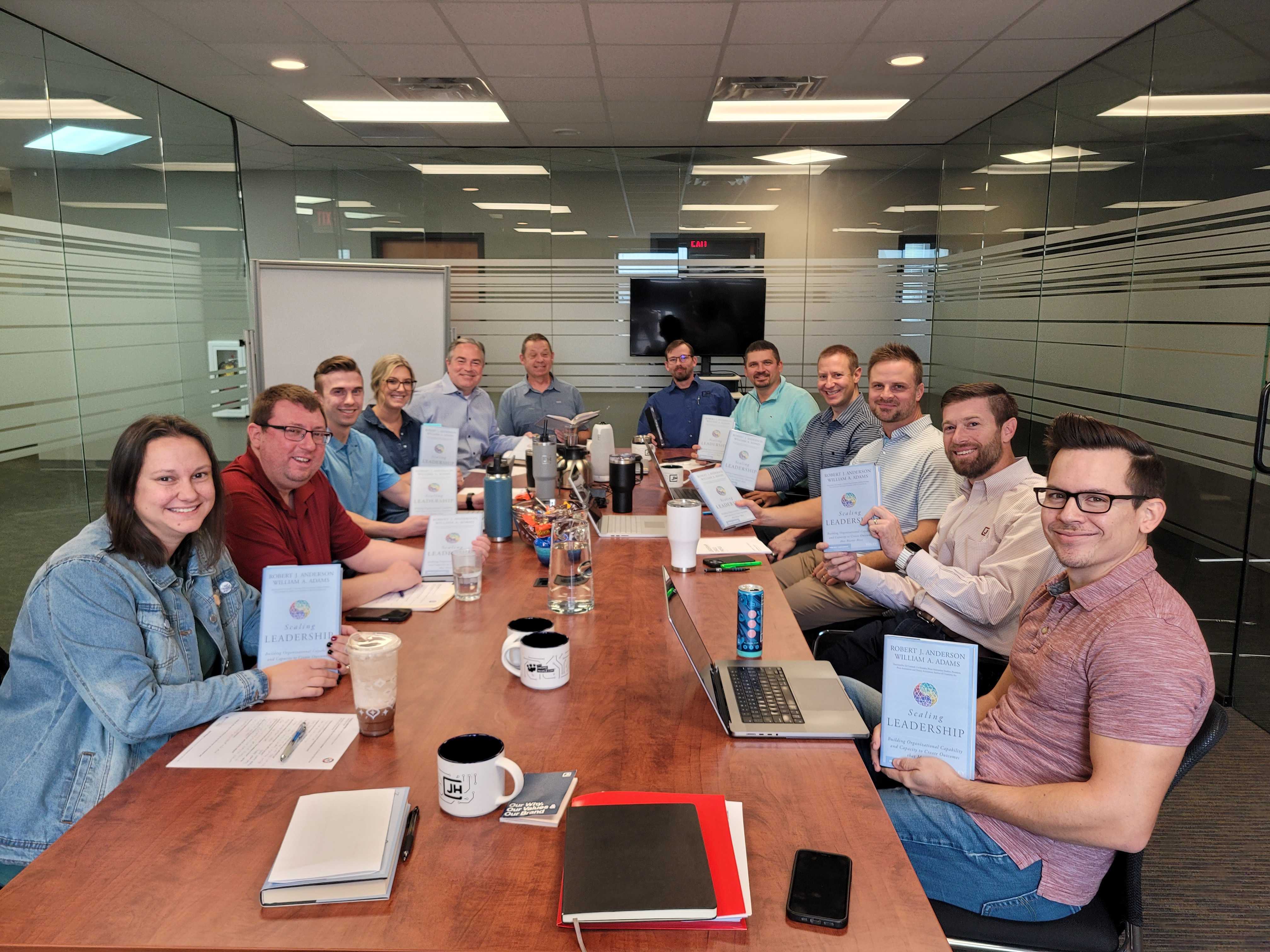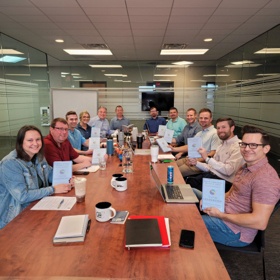The full leadership team at JH spent 2023 coming together once a month for a book club.
Brief Summary: How do senior leaders, in their own words, describe the most effective leaders--the ones that get results, grow the business, enhance the culture and leave in their wake a trail of other really effective leaders? Conversely, how do senior leaders describe the kind of leader that undercuts the organization's capacity and capability to create its future? This book, based on groundbreaking research, shows how senior leaders describe and develop leadership that works, that does not, that scales, and that limits scale.

We asked each leader to share one takeaway - the thing that stood out most - from this book. Here's what they had to say ...

"The lack of empowering others to get the job done or empower people to make decisions and resolve issues." This is one of the top 10 leader liabilities that can tear down a team. Being on a small team and used to making most of the decisions and having most of the answers makes the transition into leadership a major blind spot. Throughout this book, this reflection has allowed me not only to begin delegating and entrusting others to make decisions and take on tasks that allow me to focus more on strategy and leadership but also has allowed me to coach others on the team who struggle with the same blind spot. Watching this transition has not only removed stress off of my plate but also improved the relationship/trust that I have with my team.

I’m not new to leadership roles, I’ve been in them before, however this time around I feel it’s been more impactful. The book Scaling Leadership has been helpful to shed some light on topics and tactics I’ve used or have been using in the past, as well as give more clarity into why some leadership practices don’t work. Talking about it in a large company-wide group as we have been has given leadership at all levels that grand insight into what works and what doesn’t work. Knowing that we can better work together to lead the company as a collective and continue to train and build more successful leaders as the company grows.

The idea that stuck with me most was the fact that your positive contributions can be canceled out by your negative ones. I can be an ideal individual contributor, but those same skills don't make me an ideal manager. Focusing on how to turn my reactive traits into creative traits will help myself and JH to grow.

The skills that GOT you into a leadership position might not be the skills you need to thrive in that position. Leadership requires the development of new strengths to scale the capacity and capability of your team. We can either embrace those new challenges and work on developing ourselves into a creative leader that unlocks the true potential of our team or stick with our go-to strengths that limit our team’s effectiveness over time.

Generative tension is the idea that to scale and meet our vision or desired result, leaders must create tension between our current reality and the goals. This starts with vulnerable trust - the willingness to be open about mistakes and weaknesses. We have to tell the truth about our current reality ... "where are we not meeting our goals?". Implementing feedback loops to learn about the current reality is one way to do this.

Reflecting on our study, a crucial lesson learned is the necessity for leaders to adopt a sustained, systemic strategy to scale leadership effectively. This entails embracing change openly, both publicly and personally, while embracing vulnerability. To achieve this, my plans include prioritizing leadership development, empowering my team to take ownership of projects, and resisting the temptation to intervene. Instead allowing them to navigate challenges independently through collaboration and feedback. I'll also strive to cultivate a culture where challenging discussions are welcomed, with openness, empathy, and authentic dialogue among team members.

My biggest takeaway from the book was the idea of engaging in servant leadership by focusing on what is good for the “whole” (and not me personally). This requires going into uncomfortable areas (purpose) vs. sticking to what I know (safety). As I drive toward this common purpose, personal success should be balanced by the success of others and the organization. To do this, I need to look inwardly as to how I can grow (creative vs. reactive), garner feedback from others, and put change into action. I'm excited about what's ahead at JH.

One key learning from Scaling Leadership that spoke to me directly was the principle that the strengths (skillsets, talents) that got you to where you are may not be what is needed to get you to where you want to go. An analogy was used where in professional baseball, a league-leading hitting coach was promoted to the head coach position (manager). Ownership felt that what made him such an incredible hitting coach would translate to becoming a great head coach. In this example, the hitting coach lacked the key leadership strengths that were now needed in his new position, and this became very evident early in the transition. In conclusion, as I grow as a leader I should need to constantly be evaluating where my leadership gaps are and embrace the challenge to change and grow for my team.

Being an effective leader often requires a different set of skills compared to the skills that one relied upon to be elevated to a leadership role. Keys to success include creating an environment where feedback of all kinds is encouraged and there is a high level of trust between the leader and their team. Making an effort to empower others, developing their capability and capacity, and cultivating strong relationships with your team is imperative to success.

The strengths we rely on to be successful, effect change, and excel early in our careers often are not the same strengths needed to lead and grow an organization; they can become liabilities if left unchecked. To become ideal leaders and instill continual growth in our team members, it’s important we continue educating ourselves at the same time (together), undo the potentially destructive behaviors that got us here, and develop the new skills and strengths our teams require of us for the greater good. Implementing a culture of continual feedback, staying vulnerable, and creating deep relationships while trusting our team members to succeed will allow others to organically step up into new leadership roles along the way and scale the company exponentially!

I really enjoyed reading Scaling Leadership by Robert Anderson & William Adams. The content was great and included a self-assessment and a ton of data to consider and implement in my ongoing interactions with my team. While the content was great, the people I shared the journey with really made it special. The leadership team is as big as it ever has been at JH. I saw new and tenured leaders' eyes light up. I heard conversations within our monthly reviews that were authentic. People were vulnerable to discussing their learnings because they had the trust of their peers to support them, not judge them. The underlying theme was empowering people through creative leadership and soliciting feedback from your team to continue your journey of being a great leader. I am confident that individuals on our team are better from this effort, and that JH as a whole is better because of it as well.




